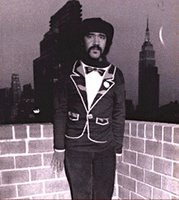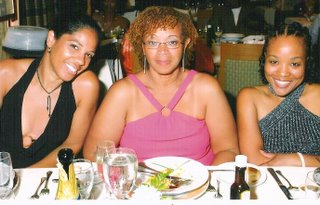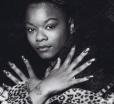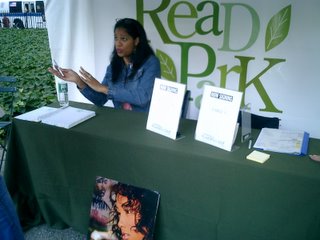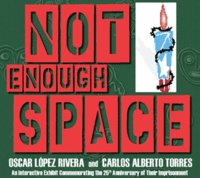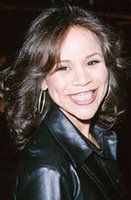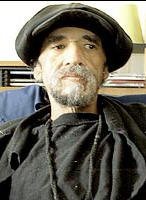Before leaving to catch my plane to Miami this afternoon, I did an interview on a Magic City-based radio show. The show is called
And the Women Gather and is hosted by
Lorna Owens. We were discussing
Picture Me Rollin', misogyny in hip hop and other things. Then she opened the phone lines so listeners could call in with their questions and comments.
The one caller who made it through was an angry man. He yelled, "YOUR SHOW SUCKS, BITCH!" And it wasn't censored.
Lorna and I were silent for a few seconds. Not that I didn't have a response, but I wanted to respect that I was a guest on her show. And since she was in the studio in Miami, and I was at home in New York City, I could see her and use her body language or facial expressions to guide me.
We eventually recovered, turning back to the subject at hand, but I first had to acknowledge the verbal attack. I didn't want to make things worse or give it more energy than it deserved, but I still felt it had to be addressed. So I said something to the effect: "Well, Lorna, there's an example of the misogyny we were just discussing. When women speak their truth, some men feel threatened." While I kept my language diplomatic, my tone had an undeniable edge to it.
Lorna was a bigger woman than I was. She wished for the brother to find the healing that he needed. And she meant it.
The interview went back on track and ended on a good note, but that ugly moment stayed with me long after I hung up. I mean, some dude actually got up that early on a Saturday morning to listen to a show he didn't like, waiting for his chance to call in and spew hate. At my worst moment this morning, I was wondering if this was the kind of cat who would go so far as to, say, roll up on me at my reading at the book fair and, like, set off some shit.
I saged. I asked my ancestors -- some whose names I only learned a month ago -- to protect me. And I preoccupied myself with last minute errands before heading out to the airport to keep my mind from replaying the nasty episode in my head.
On the bus to LaGuardia, I started reading a new book I had bought on writing called
Word Painting: A Guide to Writing More Descriptively by Rebecca McClanahan. At one point, McClanahan quotes a passage from poet Audre Lorde to demonstrate the vividness with which she describes an ordinary household item. The name Audre Lorde immediately evokes
Picture Me Rollin' for me be cause my protagnist Esperanza discovers Lorde's work during the course of the novel. In particular, I quote a particular passage from
Sister Outsider that resonates with Esperanza at a critical point in the story, and reading Audre's name in
Word Painting echoes the lines in my head:
"I was going to die, if not sooner than later, whether or not have spoken myself. My silences have not protected me. Your silence will not protect you."And as I repeated these words to myself like a mantra, all my anxiety and paranoia about how far a hateful brother might go started to melt. I had said what I had to say as did Lorna. And if this dude wanted to wild out because of it, well, my staying quiet would not have prevented him. My silence would not protect me. And if in the most likely scenario, he had other things to do on a Sunday afternoon than track me down to do God knows what because I suggested he was threatened by women critiquing the misogyny in hip hop, where would that leave me if I had not said my piece? Kicking myself on Sunday night for (1) wasting time and energy worrying about something that never transpired, (2) holding myself in such high regard that someone would go to such extremes to silence me, and (3) taking that misogyny -- even internalizing it by blaming myself for what happened -- by not standing up for myself.
Whatever's going to happen is going to happen. I can't control anyone else, least of all those who feast on hate and derive a false sense of power from violating others. I only can control myself, and I do myself a tremendous disservice by when -- as Audre Lorde wrote and Esperanza discovers in
Picture Me Rollin' -- I betray myself into small silences because my silence will not protect me. By being silent, I do the work of the hateful for them.
I closed the book and sat there in amazement. In
Picture Me Rollin', Audre's words come to Esperanza at a certain time and change the course of her life. Now I believe in synchronicity so I have no doubt that these same words came to soothe me in my own moment of distress. Still I was bowled over about the power that particular sentence -- and even just Audre's name as the woman who authored them into existence -- wielded over me personally. I had forgottent that even as I incorporated them in a novel hoping to touch young women just like Esperanza in the same way they had touched me when I first read them.
Despite being a woman of words, I myself had underestimated just how powerful words can be both in their presence and absence. These words returned to me at time when I needed them, dissipating anxiety, paranoia, and fear. Imagine if they had never been written or if I had never read them.
I'm still amazed. When I return home, I'll post another audio entry reading that passage of
Sister Outsider that I quote in
Picture Me Rollin'. I hope that you will listen to them, and that they will do a similar magic in your life according to your needs. And I pray that the lessons that I relearned today stay with me for a very long time, especially as I continue to promote this novel and finish
Burn.Synchronicity is real.
Words are magic that can be used to heal or harm.
My silence will not protect me.
